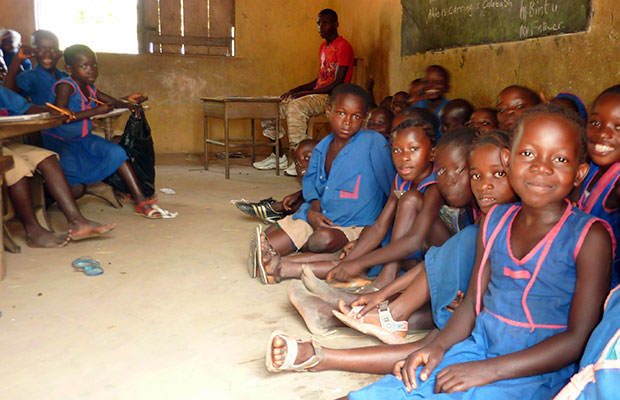
A Brighter Future for Ebola Orphans in West Africa
Late last year, as the Ebola crisis was raging in West Africa, a parallel “epidemic” was emerging: one that stigmatized little girls and boys who lost one or both parents to the disease. Ostracized by society due to fear and misunderstanding, these innocent orphans had nowhere to turn — and could easily have become Ebola’s tragic legacy. Today, however — with the help of our Salesian missionaries, partners and friends — they are finding new reasons to smile.
“From the beginning, we have been deeply concerned about the futures of the children who manage to survive this brutal epidemic,” says Father Mark Hyde, director of Salesian Missions. “We have been called to take an active role in their rescue, rehabilitation and ultimate reintegration into society — and are slowly beginning to see the positive results of these efforts.”
In Freetown, Sierra Leone, for example — where Salesian missionaries built a special care center for Ebola orphans — 120 children receive healthcare, psychological therapy, educational opportunities and the chance to process the trauma of their experiences through music, dance and other activities.
In Monrovia, Liberia, more than 200 girls and boys between the ages of 4 and 17 live at an interim child care center set up by the Salesians for Ebola orphans. “Some were very weak when they arrived, unable even to speak or walk,” says Father Jorge Crisafulli, provincial superior in West Africa. “Now, with care and good nutrition, they are making positive strides.”
This nutrition is possible thanks to meals donated by Stop Hunger Now and Feed My Starving Children, which provided 14 containers of food and supplies since the beginning of the outbreak. Through partnerships with U.S.-based aid organizations like these, Salesian Missions coordinates and ensures the delivery of meals and supplies to those who are in need.
Of course, proper meals comprise just one part of the orphans’ care, which is based on holistic principles. “Children have a deep longing for encounter and relationships, and this was abruptly unsettled by their parents’ deaths and their own stigmatization,” says Brother Lothar Wagner, director of Don Bosco Fambul in Freetown.
“What is important to them,” he continues, “is the support necessary to heal their trauma, move past the stigma, and begin the process of reuniting them with their extended families.”
In many circumstances, reunification efforts are proving challenging, as the children’s relatives have refused to accept and care for them. Often, this has very little to do with the children’s status as survivors; instead, the children have been dispossessed of land rightfully inherited from their parents.
“It is a gross injustice,” says Fr. Crisafulli, “and one we intend to remedy. We have already hired lawyers to defend the children’s rights.”
While they await the results of such efforts, many children have also returned to the classroom — a goal Salesian missionaries have prioritized from the beginning.
“We know from experience that youth who are out of school for an extended period of time often never go back,” says Fr. Mark, director of Salesian Missions. “This places them at high risk for exploitation and — especially in West Africa right now — has dire implications not only for children themselves, but for the economy and stability of the region as a whole.”
Fortunately, as the rate of new infections continues to decline in the region, schools have begun to re-open. In the parish of Matadi, outside Monrovia, Liberia, more than 100 students who otherwise would not have been able to afford their school fees have resumed their education in Salesian classrooms.
“Providence continues to move the hearts and open the hands of many,” says Father Nicola Ciarapica, rector of the Salesian community in Matadi. “We can testify that even in the situation of suffering caused by the Ebola infection, dedication, solidarity and love are bringing life.”
This is thanks to the caring kindness of many generous friends, who are helping bring new hope, and bright smiles, to the orphans of Ebola.
Our mission is to protect victimized youth and provide them with hope for a better future. What’s your mission?

